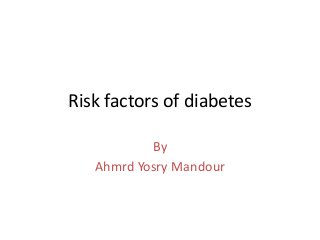Risk factors of diabetes.pptx
Diabetes is a world-wide public health problem. About 422 million people worldwide have diabetes, the majority living in low-and middle-income countries, and 1.5 million deaths are directly attributed to diabetes each year. Both the number of cases and the prevalence of diabetes have been steadily increasing over the past few decades in countries of all income levels. Diabetes is a chronic, metabolic disease characterized by elevated levels of blood glucose (or blood sugar), which leads over time to serious damage to the heart, blood vessels, eyes, kidneys and nerves. The most common is type 2 diabetes, usually in adults, which occurs when the body becomes resistant to insulin or doesn't make enough insulin. In the past 3 decades the prevalence of type 2 diabetes has risen dramatically in countries of all income levels. Type 1 diabetes, once known as juvenile diabetes or insulin-dependent diabetes, is a chronic condition in which the pancreas produces little or no insulin by itself. For people living with diabetes, access to affordable treatment, including insulin, is critical to their survival. There is a globally agreed target to halt the rise in diabetes and obesity by 2025. Symptoms of type 1 diabetes include the need to urinate often, thirst, constant hunger, weight loss, vision changes and fatigue. These symptoms may occur suddenly. Symptoms for type 2 diabetes are generally similar to those of type 1 diabetes but are often less marked. As a result, the disease may be diagnosed several years after onset, after complications have already arisen. For this reason, it is important to be aware of risk factors. Type 1 diabetes cannot currently be prevented. Effective approaches are available to prevent type 2 diabetes and to prevent the complications and premature death that can result from all types of diabetes. These include policies and practices across whole populations and within specific settings (school, home, workplace) that contribute to good health for everyone, regardless of whether they have diabetes, such as exercising regularly, eating healthily, avoiding smoking, and controlling blood pressure and lipids. The starting point for living well with diabetes is an early diagnosis – the longer a person lives with undiagnosed and untreated diabetes, the worse their health outcomes are likely to be. Easy access to basic diagnostics, such as blood glucose testing, should therefore be available in primary health care settings. Patients will need periodic specialist assessment or treatment for complications. A series of cost-effective interventions can improve patient outcomes, regardless of what type of diabetes they may have. These interventions include blood glucose control through a combination of diet, physical activity and, if necessary, medication; control of blood pressure and lipids to reduce cardiovascular risk and other complications; and regular screening for damage to the eyes, kidneys and feet to facilitate early treatment

Recommended
Recommended
More Related Content
Featured
Featured (20)
Risk factors of diabetes.pptx
- 1. Risk factors of diabetes By Ahmrd Yosry Mandour
- 2. What is diabetes mellitus Diabetes mellitus is a chronic disease Caused by 1- inherited and/or acquired deficiency in production of insulin by the pancreas. 2- or by the ineffectiveness of the insulin produced. Such a deficiency results in increased concentrations of glucose in the blood, which in turn damage many of the body's systems, in particular the blood vessels and nerves.
- 3. Types of diabetes mellitus
- 4. Diffrences between type 1 and 2 DM
- 6. What causes type2 diabetes i.e. genetic defects/mutations responsible for insulin secretion and resistance Exact cause is Unknown. may be: Idiopathic Triggered by external factors Triggered by internal factors as hormonal changes Inherited susceptibility.
- 7. Risk factors ( epidemiological determinants) of Type 2 diabetes A- life style (modifiable determinants)=50% 1- obesity and overweight (BMI=25 kg/m2) 2- physical inactivity 3- unhealthy diet 4- tobacco smoking 5- alcohol use 6- stress and worry.
- 8. Risk factors ( epidemiological determinants) of Type 2 diabetes B- Environmental factors (triggers) =10 % Physical , chemical or biological Act as initiators of genetic mutation or genetic defect
- 9. Risk factors ( epidemiological determinants) of Type 2 diabetes C- personal factors Genetic (hereditary determinants):positive family history (30 -100%) Age >45 year Residence (urban> rural) , socioeconomic, race Previously identified impaired glucose tolerance History of gestational diabetes or delivery of baby over 4 kg Metabolic syndrome esp. in middle and old age
- 10. Risk factors ( epidemiological determinants) of Type 2 diabetes D- Health policies, health systems and services factors (10%)
- 11. Diabetogens i.e. substances and exposures that increase risk of type 2 DM Include: Life style: unhealthy diet, tobacco smoking, unhealthy alcohol use Environmental: pesticides (rodenticides), viral infection as mumps and coxsackie B virus. Drug induced e.g. corticosteroids & thiazide diuretics.
- 12. What causes type 1 DM? Unknown Thought to be autoimmune reaction (autoantibodies) that destroy islets beta cells of pancreas that produce insulin. Triggers are not clear as type 2, but include environmental (viruses, dietary, toxins) and genetic susceptibility.
- 13. Type 1 diabetes risk factors A- Life style: unhealthy diet, stress B- Environmental: viral infection e.g. congenital rubella syndrome (CRS) some pesticides (rodenticides) C- Personal factors: age (child), race (north Europe), genetic susceptibility (30% risk in monozygots).
- 14. The most popular hypothesis is that viral infection enhance autoimmunity Viruses associated with type1 DM include: Coxsackie B (CVB) Cytomegalovirus (CMV) Rota Mumps Rubella (only congenital rubella syndrome has conclusively associated with type 1 DM)